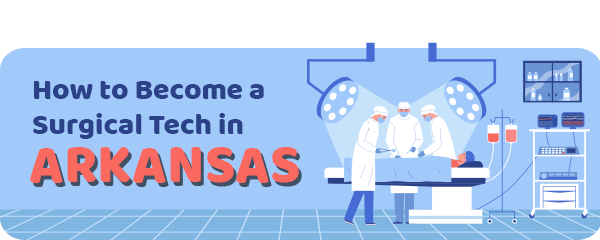Medical facilities in Arkansas are equipped with a dedicated team of healthcare professionals ready to respond promptly, particularly in emergencies.
This group of essential personnel comprises:
- Surgeons
- Anesthesia specialists
- Surgical nurses
- Surgical technicians
Their collaboration begins before the surgical procedure commences and extends beyond the surgery’s conclusion.
Additionally, these professionals may also be referred to as operating room (OR) technicians or scrub technicians.
Article Table of Contents
Surgical Technologist Job Description and Responsibilities
Surgical technologists are responsible for a wide range of tasks during their shifts, which encompass:
- Preparing patients for surgery
- Assisting in the transportation of patients to and from the operating room
- Setting up the operating room with the necessary surgical equipment and supplies
- Vigilantly monitoring the count of surgical instruments throughout the procedure
- Providing surgeons with the required medical instruments
- Participating in wound closure and patient bandaging
It’s important to note that this list does not cover all the responsibilities of these medical professionals.
Surgical Technologist Training and Education
Surgical technicians in Arkansas are not governed by any specific institution but rather fall under the jurisdiction of their employers.
However, this doesn’t imply that obtaining this role is straightforward.
Let’s explore the process in more detail!
Your journey to become a surgical technician typically begins with the completion of high school or obtaining a GED.
The next step is enrolling in a training program designed for this occupation.
It’s important to note that both education and clinical training are essential for this profession.
Several institutions across Arkansas offer such training programs.
While their admission requirements may vary slightly, many share common prerequisites, including coursework in:
- Microbiology
- Pathophysiology
- Pharmacology
- Anatomy
- Physiology
- Medical terminology
- CPR and/or BLS and/or AED certification
Bevill State Community College 
This institution offers a program that covers various subjects, including:
- Sterile processing
- Infection control
- Sterilization
- Instrumentation identification
- Safety
Prospective students must meet specific prerequisites, including having a high school diploma or GED, passing the Accuplacer placement exam, and, where possible, having prior medical-related experience.
University of Arkansas for Medical Sciences 
Located in Little Rock, it offers a Surgical Technology Program that accommodates both full-time and part-time students.
The full-time program spans three semesters, while the part-time option extends over five semesters.
This comprehensive program encompasses 70 credits, consisting of 39 prerequisite courses and 31 surgical technology courses.
Each fall semester, UAMS admits sixteen students into the program, and upon successful completion, graduates are awarded an Associate of Science (AS) in Surgical Technology.
Baptist Health College 
The college provides students with the flexibility of choosing between a Certificate Program and an Associate of Applied Science (AAS) Degree Program.
For the AAS degree, students must first complete 31 credit hours of general education coursework.
The Certificate Program can be finalized in one year, while the AAS degree program typically spans two years.
This full-time program integrates classroom instruction with clinical hours and commences in both January and July of each year.
North Arkansas College in Harrison 
It offers students the opportunity to earn either a Technical Certificate or an Associate of Applied Science (AAS) Degree in Surgical Technology.
The program equips students with the knowledge and practical experience required to take the NBSTSA exam and excel as surgical technologists.
The Certificate Program consists of 31 credit hours, achievable within one year, while the AAS degree program spans 60 credit hours, generally completed over two years.
Calhoun Community College 
The training program at Calhoun Community College has a duration of approximately two years or four semesters.
Students engage in classroom, laboratory, and clinical instruction.
To pursue an AAS at this college, you must complete an additional 18 general education credit hours.
Admission to the program requires:
- Online application,
- Attendance at a program information session
- Successful completion of a Manual Dexterity Exam
- Meeting all of the college’s specific admission criteria
| School Name | Address |
|---|---|
| Baptist Health College | 11900 Colonel Glenn Rd, Little Rock, AR 72210 |
| University of Arkansas for Medical Sciences | 4301 W. Markham St. Little Rock, AR 72205 |
| Calhoun Community College | online |
| Bevill State Community College | online |
| North Arkansas College in Harrison | 1515 Pioneer Dr, Harrison, AR 72601 |
Certification for Surgical Technologists in Arkansas
While certification is not legally mandated, many employers in Arkansas prefer to hire certified surgical technologists.
Several certifying bodies offer certifications for this profession, including:
- National Surgical Assistant Association (NSAA)
- Grants the Certified Surgical Assistant (CSA) qualification.
- National Board of Surgical Technology and Surgical Assisting (NBSTSA)
- Provides the Certified Surgical Technologist/Certified First Assistant credential.
- National Center for Competency Training (NCCT)
- Offers the Tech in Surgery Certification.
Among these, the NBSTSA certification is the most reputable, enjoying national recognition.
Testing centers are located in various cities across Arkansas.
The certification exam comprises 200 questions, with a passing threshold of a minimum of 119 correct answers.
Taking the exam requires payment of an associated fee, with different rates for members and non-members of the Association of Surgical Technologists (AST).
Certification renewal typically occurs every four years and can be achieved by either retaking the certification exam and it involves repaying the exam fee.
There’s another available option that consists of accumulating 60 education credits through continuing education during the renewal period.
Renewal also requires the payment of a renewal fee.
Surgical Technologist Salary in Arkansas
While this may not be the most glamorous profession, it’s important to be aware of the potential income in this field.
In Arkansas, an OR technician can earn an average annual salary of about $46,800.
The following table highlights cities within Arkansas where these professionals earn higher salaries compared to the state average:
Annual Salary Range:| Location | Avg. Annual Salary |
|---|---|
| Sturkie | $47,600 |
| Salem | $47,600 |
| Scott | $47,400 |
| Alexander | $47,300 |
| Walcott | $47,200 |
| Piggott | $47,200 |
| Vanndale | $47,200 |
| Williford | $47,100 |
| Poughkeepsie | $47,100 |
| Yellville | $46,900 |
Regional Salary in Arkansas
| Region | Employed | Avg. Annual Salary | Avg. Hourly Pay | Top 10% Annual Salary | Bottom 10% Annual Salary |
|---|---|---|---|---|---|
| Fayetteville-Springdale-Rogers, AR-MO | 280 | $54,100 | $26.01 | $75,340 | $35,490 |
| Fort Smith, AR-OK | 150 | $49,200 | $23.65 | $68,040 | $37,520 |
| Jonesboro, AR | 110 | $49,630 | $23.86 | $64,940 | $37,290 |
| Little Rock-North Little Rock-Conway, AR | 560 | $51,800 | $24.91 | $65,350 | $37,300 |
* Employment conditions in your area may vary.
Frequently Asked Questions
Where Do Surgical Technologists from Arkansas Find Work?
These technologists usually work in a hospital’s surgery wing.
Furthermore, these other places also hire such specialists:
- Children’s hospitals
- Cosmetic surgery centers
- Specialty clinics for surgical procedures
What Sills Do I Need To Work As A Surgical Tech in Arkansas?
Here are the most important skills this profession requires:
- Able to work as part of a team
- Detail-oriented
- Take direction
- Understanding medical terms
- Understanding medical methodology
- Good communication skills
Can a Surgical Tech From Arkansas Choose a Specialty?
YES!
Just like surgeons can choose to operate on a specific body part, so can these techs.
Here are the most commonly chosen surgery niches:
- General surgery,
- Ob/gyn,
- Urology,
- Plastics,
- Neurology
Read the full guide: How to Become a Surgical Technologist




